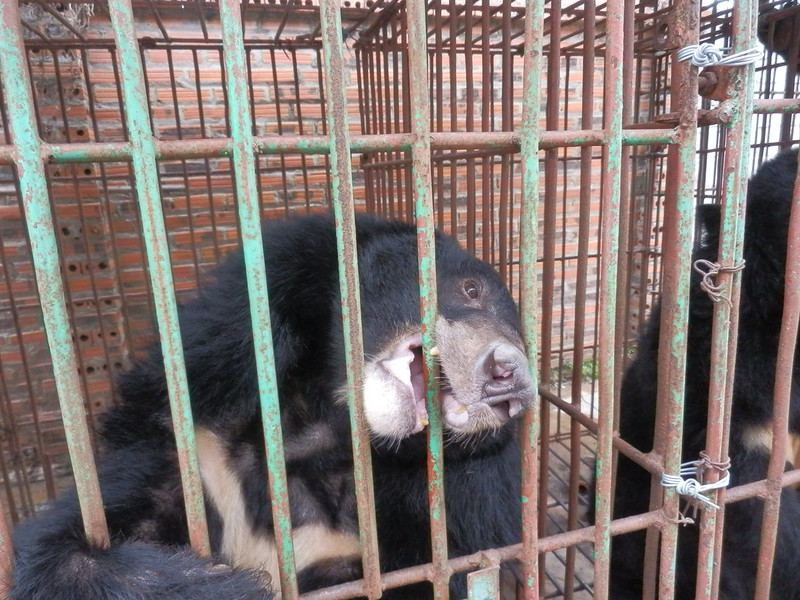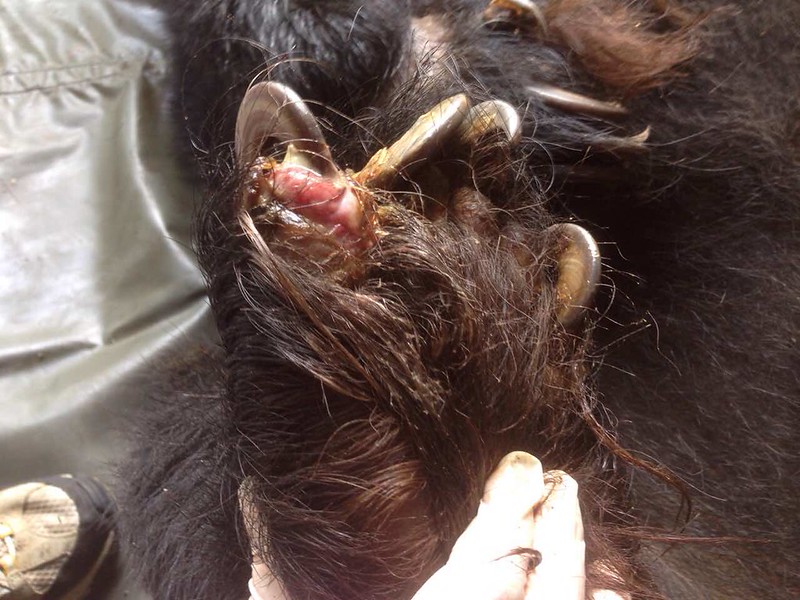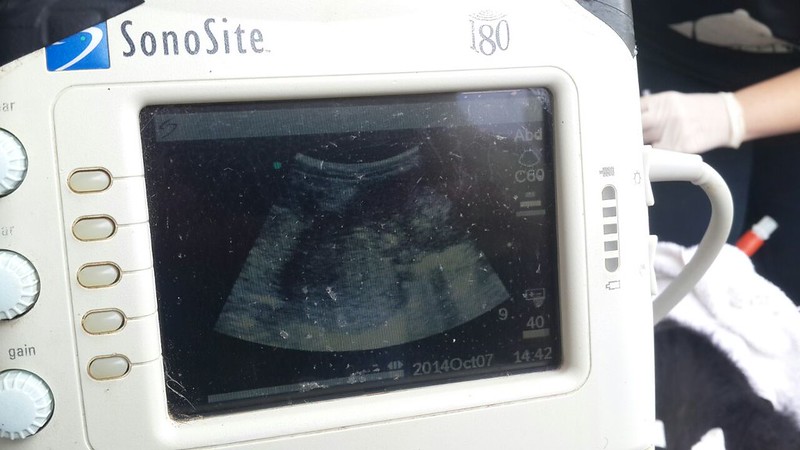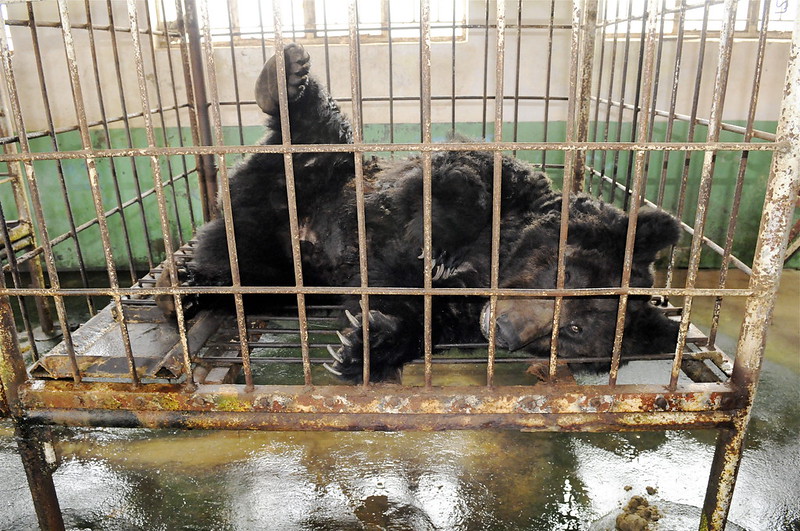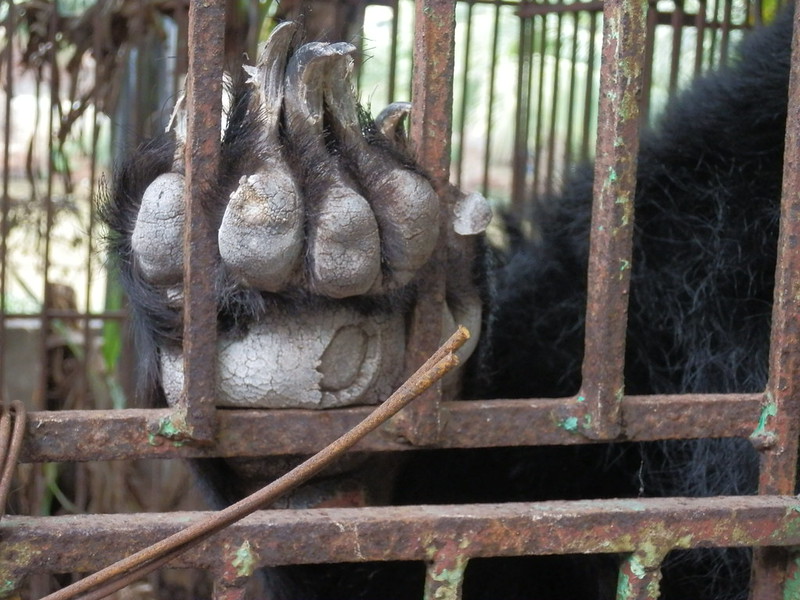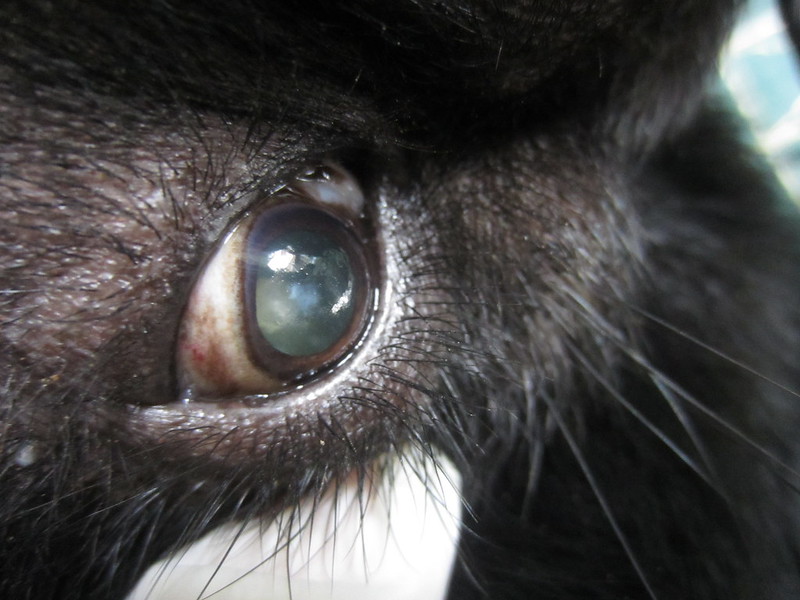How bear bile farms leave their victims broken and blind
19 October 2017
While extraction techniques vary between Vietnam and China, bile farming in both countries causes unimaginable suffering to thousands of bears.
Bear bile has been used in traditional Asian medicine for thousands of years to treat liver and gall bladder problems in humans.
However, since the 1990s bear bile has been extracted from bears on a commercial scale using various invasive techniques which cause unimaginable suffering, physical and psychological scarring and long-term health problems.
While techniques vary between Vietnam and China, each involves bears being crammed into tiny cages where they are barely able to turn around.
Once rescued, the difficult task of giving these long-suffering individuals pain-free futures with a high quality of life begins.
Here are the most common health issues arising from this cruel practice:
1) Severely damaged teeth
Broken and infected teeth are the most common affliction suffered by bile farm bears.
Some have broken their teeth over years of vainly trying to chew through iron bars, while the soft diet of rice gruel allows tartar to build up and infection to fester.
Some rescued bears have even been found with infections from broken teeth that have rotted right into their jaw bones.
Once rescued, most bears must have dental surgery to remove pain while a suitable diet of hard foods, fruit and vegetables soon cleans away the tartar and plaque left by a lifetime of slops and rice gruel.
2) Missing body parts and open wounds
Farmed bears are often rescued with missing limbs – most likely suffered when caught in hunters’ snares in the wild – leaving them permanently disabled.
Of the 187 bears rescued by Animals Asia in Vietnam, 23 were missing an arm, leg or paw, while in China one in 10 have lost limbs.
Others have had the tips of their fingers chopped off to permanently prevent their claws from growing back.
Many farmed bears have never seen a qualified veterinarian in their life with open wounds allowed to fester into serious infections. When moon bear Snow was rescued from a farm in Vietnam, he was suffering from deformed back paws as a result of captivity, which had caused his claws to grow into the pads of his paws.
Animals Asia vets found the claws had ingrown up to 3 centimetres causing rotting and pus-filled wounds which would have happened slowly and painfully over the course of at least a year.
Two rescued bears have even been found missing large parts of their tongues through trauma – possibly as a result of a fight with a bear in an adjacent cage. The simple act of chewing and swallowing food becomes a daily challenge that undermines their quality of life.
3) Cancerous tumours
In China, cancerous tumours are often seen in bears that have been farmed for their bile and is thought to be the result of repeated bile extraction through invasive and unsanitary surgical procedures.
Tragically, 30 percent of the bears which have died at Animals Asia’s China Bear Rescue Centre (CBRC) have died from cancer of the liver or gall bladder system – making it the leading cause of death at the facility.
While bears can and do suffer from other forms of cancer, liver and gall bladder cancers account for 85 percent of all cancers diagnosed in bears rescued from Chinese bile farms by Animals Asia.
Bears frequently suffer infections resulting from crude surgery to extract bile, which is done by creating an opening through their abdomen to their gallbladder. As the body tries to heal naturally, each bile tapping session involves forcing a metal tube through the wound and scar tissue to reach the bile in the bear’s gallbladder.
Infections also arise from the use of ‘metal jackets’ with sharp spikes and strips of metal that, although illegal, are sometimes still put on bears to keep bile-draining catheters in place.
4) Severe muscle weakness and early onset arthritis
Even very young farmed bears can suffer from stiffened limbs, muscular atrophy and early onset arthritis from years of being confined in small cages.
They leave these horrendous conditions with contorted bodies that have spent too long pressed against bars. Deformed limbs are also common in bears that have been held for a prolonged period in tiny cages.
At Animals Asia’s China sanctuary, 87 percent of the bears receive medication to treat pain related to mobility orders. Some are so badly affected that they require up to six different medications to keep them pain-free and mobile.
Tragically, these conditions can be fatal. Nearly a quarter of all bear deaths at CBRC can be attributed to mobility disorders such as severe arthritis and spinal disease.
5) Stereotypic behaviour
The pain farmed bears suffer from is characterised not only by their physical condition but also by self-mutilation and noisy, aggressive or stereotypic behaviours (repetitive behaviours) which are thought to be a coping mechanism.
With daily stimulation, health care, exercise and the companionship of other bile farm survivors, stereotypic behaviours in rescued bears can be markedly reduced.
6) Painfully dry and cracked paws
Having never set foot on grass, bears rescued from bile farms almost always suffer from painfully dry, cracked paws.
As well as being a result of having only stepped on iron bars, the condition is also caused by inadequate nutrition, generally poor body condition and dehydration.
Thankfully, for the typically dry and cracked paws of bile farm bears, all it takes is a return to instinctive behaviour, a natural environment, free access to water and time for them to heal and become soft again.
7) Loss of eyesight
Poor eyesight or blindness is sadly all too common in bears living at Animals Asia’s sanctuaries, with 60 percent of all bears at CBRC having some degree of eye disease
Staff believe that the miserable diets, severe dehydration and chronic stress that caged bears are subjected to – which results in many bears banging their head against the bars – predisposes them to ocular disorders.
Eye problems can include retinal detachment, lens luxation, ulcers and cataracts, among others, which cause pain and blindness in the bears.
Another serious ailment affecting eyesight is high blood pressure, known as hypertension. It is caused by chronic stress and malnutrition and without management through medication can lead to blindness and organ damage.
To date, Animals Asia has rescued over 600 bears – mostly from the bear bile industry – with around 380 bears continuing to live out their lives at sanctuaries in Vietnam and China.
BACK
